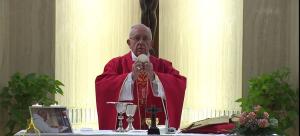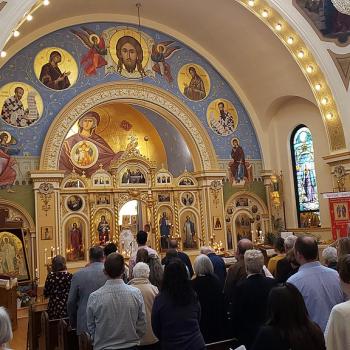
In his video message, which includes his prayer intention for July (2023), Pope Francis tells us: “If you are the same at the end of Mass as you were at the beginning, something is wrong.” [1] He reminds us that when we partake of communion, the transformation which began with the bread and wine should continue in and with us. To properly receive the eucharist, to worthily receive it, as it were, we should be ready for that transformation, so that the eucharist will not only be received for the forgiveness of our sins, but it will give us the grace to be better than we what we were. We are to become what we receive, that is, what we eat: the presence of the body and blood of Christ on earth, “The Eucharist is the presence of Jesus, it is deeply transforming. Jesus comes and must transform you.” [2] If we resist that transformation, we partake of it with a bad intention, which Paul warns us not to do: “Whoever, therefore, eats the bread or drinks the cup of the Lord in an unworthy manner will be guilty of profaning the body and blood of the Lord” (1 Cor. 11:27 RSV).
We are should receive Christ in a worthy manner. We should welcome the transformation which Christ wants to happen inside us, the transformation which will make us become what we eat, that is his presence on earth. Just as we are to be nourished by him, so, we, after being nourished through communion, should offer ourselves to others so as to help them receive the nourishment they need in their lives: “In the Eucharist, it is Christ who offers Himself, who gives himself for us. He invites us, so that our lives may be nourished by Him and may nourish the lives of our brothers and sisters.” [3]
Our reception of the eucharist does not end with the placement of communion in our mouth, but rather, it only begins there; Christ comes to nourish us with the bread of life, himself, so that what we lack in and of ourselves, what we need for our own spiritual nourishment, we can have from him. But once we have it, we find ourselves changed. Being nourished by Christ transforms us so that we find ourselves becoming what it is we believe the eucharist to be, the presence of Christ in the world, but we are to become that presence in an active, not passive manner. “The Eucharistic Celebration is an encounter with the Risen Jesus. At the same time, it is a way of opening ourselves to the world as He taught us.”[4] If we eat the physical bread and wine, but resist the spiritual reality and the communion which it is meant to establish in us, we still partake of Christ, but we do so resisting Christ himself, and risk facing the consequences of such resistance, which is why Paul exhorted us to partake of the eucharist with the right intention: “For any one who eats and drinks without discerning the body eats and drinks judgment upon himself” (1 Cor. 11:28 RSV). If we are not open to being transformed by the eucharist, then we resist the will of God. Not only can we be said to have sinned based upon our disposition, but our sin is such that we deny ourselves the forgiveness and grace which otherwise can be found in communion
Thus, we must welcome Jesus and the transformation Jesus wants to have happen in us, the transformation which is possible thanks to the grace given to us in the eucharistic sacrifice. It is the offering of Christ to us. In return, we offer ourselves in love to him. Christ is the high priest. By partaking of communion, we partake of that priesthood, so we can be said to become priests in and with him. We find, therefore, we begin to offer ourselves to others as a sacrifice of love, acting in a way similar to Christ – similar, of course, because there is a fundamental difference, which is that our priesthood is participatory in nature. We are to die to the self so that we can become free persons in Christ, free persons who no longer are merely enclosed in upon ourselves. Opening ourselves to Christ, we open ourselves to others. We open ourselves to the free communion which God wants all creation to participate in, a communion of love, where all subjects share with each other their love, and in that sharing, find themselves becoming one, as Christos Yannaras explains:
The priestly ethos and dignity of man, which find its fulfillment in the eucharistic use of the world, unifies man’s life with that of the world, of God and of creation. It leaves no room for division or partition, and therefore presupposes that the division of human beings into sexes is transcended. This means that the priestly ethos and rank is not the exclusive prerogative of the male sex. The eucharistic use of the world, worked out in the human body itself, unifies the sexes in a common liturgical celebration of life. [5]
It is through Jesus, with Jesus, in Jesus, and with Jesus in us, this is possible. The eucharist transforms us so that we find ourselves sharing in Jesus’ priestly ministry to the world. We are to become intercessors for the rest of creation, giving ourselves to it with such a great love that the world can be made better.
Our love is meant to grow every time we partake of communion.“Each time we participate in the Eucharist, Jesus comes and Jesus gives us the strength to love like He loved, because it gives us the courage to encounter others, to go out of ourselves, and to open ourselves to others with love.” [6]
Resisting this, resisting love, denies the work of communion in our lives, and as such, once again, leads to the risk that we partake of it to our own condemnation. Our worthiness for communion comes from God, from Jesus himself, from grace, not ourselves; however, we have the ability to choose the manner which we partake of communion, to determine if we are open to its transformative grace in our lives, or if we partake of it as a kind of magical food which we use to control the world around us and in such a manner deny its true value::
This is like what the Apostle said: Whoever eats the bead of the Lord and drinks of his cup, while not being worthy, eats and drinks his own condemnation, because he has not discerned the body of the Lord. In fact, “unworthy” and “worthy” here do not depend upon bad or good deeds, the Apostle says, but on the mental discernment. And on the occasion of writing these things, the Apostle shows clearly in the same letter the way of thinking he laid down: let no one suppose that only the righteous are permitted to have parts in the holy mysteries, or those who are blameless or who remain sincerely repentant. [7]
This, as St. Isaac the Syrian further explains, is clarified with the context of Paul’s words:
Blessed Paul wrote this discourse to the Corinthians on the holy day of Sunday, when they were gathered in church; that the rich who were among them shared equally with the poor, in the holy mysteries according to the order held to by the Church. But after this, each was sitting down and eating and taking delight in what each had prepared at home. The poor, then, would sit while hungry and looking at the rich who were drinking and enjoying themselves. [8]
Those who celebrated the eucharist while ignoring the needs of their fellow Christians, that is, the needs of the poor who were with them at that celebration, showed that they did not properly discern what it was they were eating. They wanted to be given grace by Jesus while separating themselves from those whom they looked down upon with contempt. They did not understand or accept the transformation which lies at the heart of communion, for they resisted the love which Christ wanted them to have. By rejecting the love that they should have for others, they cut themselves off from the path of love, and so risked losing the mercy and grace which love brings with it.
This, then, is the message Pope Francis gave before offering a prayer indicating the hope he has will happen if we embrace a proper understanding of the eucharist — that is, the hope that we can encounter God in and with love, and through that love, connect with others, building up a positive relationship with them: “Let us pray that Catholics place at the centre of their lives the Eucharistic Celebration, which transforms human relationships and opens up an encounter with God and their brothers and sisters.” [9] Let us, therefore, cooperate with the Pope’s intention and open ourselves up to the transformation Christ intends us to have when we partake of him in with the eucharist.
[1] Pope Francis, Video Message With Prayer Intention For July (7-3-2023).
[2] Pope Francis, Video Message With Prayer Intention For July (7-3-2023).
[3] Pope Francis, Video Message With Prayer Intention For July (7-3-2023).
[4] Pope Francis, Video Message With Prayer Intention For July (7-3-2023).
[5] Christos Yannaras, The Freedom of Morality. Trans. Elizabeth Briere (Crestwood, NY: St. Vladimir’s Seminary Press, 1984), 100. .
[6] Pope Francis, Video Message With Prayer Intention For July (7-3-2023).
[7] St. Isaac the Syrian, “The Third Part.” Trans. Mary T. Hansbury in An Anthology of Syriac Writers From Qatar in the Seventh Century. Ed. Mario Kozah, Abdulrahim Abu-Husayn, Saif Shaeen Al-Murikhi and Haya Al Thani (Piscataway, NJ: Gorgias Press, 2015), 391 [XI.11].
[8] St. Isaac the Syrian, “The Third Part,” 392 [XI.13].
[9] Pope Francis, Video Message With Prayer Intention For July (7-3-2023).
Stay in touch! Like A Little Bit of Nothing on Facebook.
If you liked what you read, please consider sharing it with your friends and family!
N.B.: While I read comments to moderate them, I rarely respond to them. If I don’t respond to your comment directly, don’t assume I am unthankful for it. I appreciate it. But I want readers to feel free to ask questions, and hopefully, dialogue with each other. I have shared what I wanted to say, though some responses will get a brief reply by me, or, if I find it interesting and something I can engage fully, as the foundation for another post. I have had many posts inspired or improved upon thanks to my readers.













